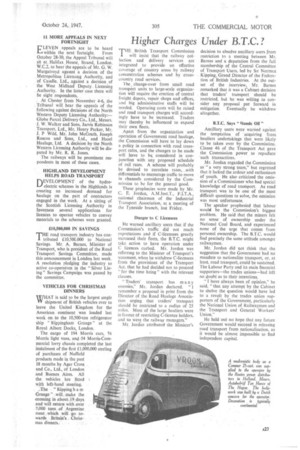Higher Charges Under B.T.C.?
Page 29

If you've noticed an error in this article please click here to report it so we can fix it.
THE British Transport Commission will insist that the railway collection and delivery services are integrated to provide an effective coverage of country areas by railway concentration schemes and by crosscountry road services,
The, change-over from small road transport units to large-scale organization will require the erection of central freight depots, repair shops an offices, and big administrative staffs will be needed. Operating costs will be raised and road transport charges will accordingly have to be increased. Traders may thereby be influenced to expand their own fleets.
Apart from the organization and operation of Government road haulage, the Commission will have to lay down a policy in connection withroad transport •rates, and the changes to be made will have to be considered in conjunction with any proposed schedule of rail rates. A scheme will probably be devised to correlate rates, . with differentials to encourage traffic to move in channels considered by the Commission to be for the general good.
These prophecies were made by Mr. C. E. Jordan, A.M.Inst.T., F.I.T.A., national chairman of the Industrial Transport Association, at a meeting of the Tyneside branch, last Friday.
Danger 10 C Licensees He warned ancillary users that if the Commission's traffic did not reach expectations and if C-licensees greatly increased their fleets, the B.T.C. might take action to have operation under C licences curbed. Mr. Jordan was referring to the Minister of Transport's statement, when he withdrew C-licensees from the provisions of the Transport Act, that he had decided not to proceed "for the time being" with the relevant clauses.
Traders transport has many enemies," Mr. Jordan declared. " I remember a proposal in print from the Director of the Road Haulage Association urging that traders' transport should be restricted to a radius of 25 miles. Most of the large hauliers were in favour of restricting C-licence holders, and so were the railway managers." Mr. Jorclan attributed the Minister's
decision to absolve ancillary users from restriction to a meeting between Mr. Barnes and a deputation from the full membership of the Central Committee of Transport Users, led by Sir Norman Kipping, Grand Director of the Federation of British Industries. At the outset of the interyiew, • Mr. Barnes remarked that it was a Cabinet decision that traders' transport should he restricted, but he was willing to consider any proposal put forward in mitigation. Eventually he withdrew altogether.
B.T.C. Says "Hands Off
Ancillary users were warned against the temptation of ' acquiring from hauliers undertakings that were likely to be taken over by the Commission. Clause 46 of the Transport Act gave the Commission power to repudiate 'such transactiOns.
Mr. Jordan regarded the Commission as'" a very strong team," but regretted that it lacked the ardour and enthusiasm of youth. He also criticized the omission of a Commissioner who had special knowledge of road trarisport. As road transport was to be one of the most difficult questions to solve, the omission was most unfortunate.
The speaker prophesied that labour would be the Commission's biggest problem. He said that the miners felt no sense of ownership under the National Coal Board, and experienced none of the urge that comes from personal ownership. The B.T.C. would find precisely the same attitude amongst railwaymen.
Mr. Jordan did not think that the suggestion that the Government had no mandate to nationalize transport, or, at least, road transport, could be sustained. The Labour Party and its main financial supporters—the trades unions—had left no doubt as to their intentions.
"I have always been of opinion," he said, "that any attempt by the Cabinet to shelve the question would have led to a revolt by the, trades union supporters of the Government, particularly the National Union of Railwaymen and the Transport and General Workers' Union."
He held out no hope that any future Government would succeed in releasing road transport from nationalization, as it would be almost impossible to find independent capital.
















































































